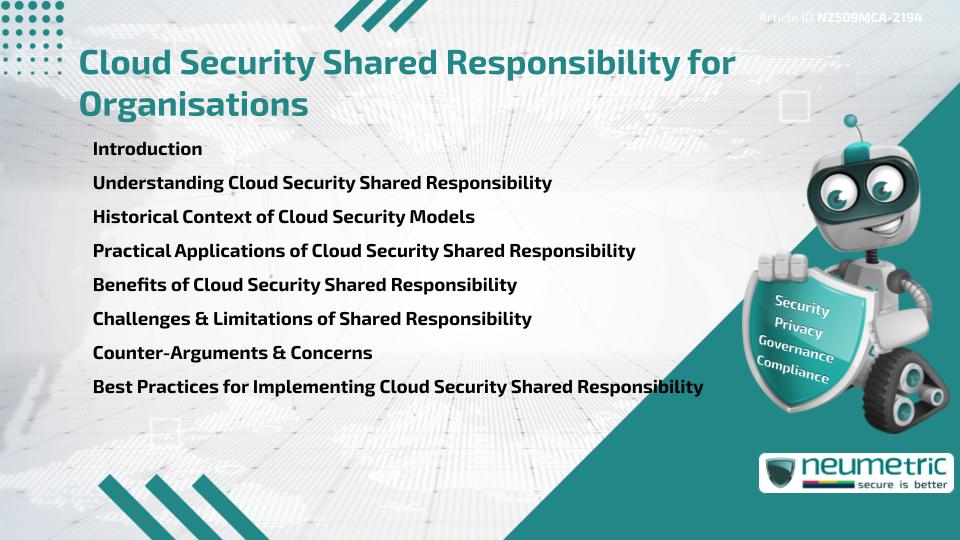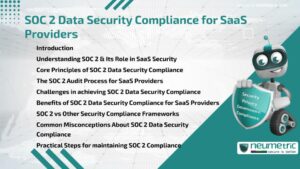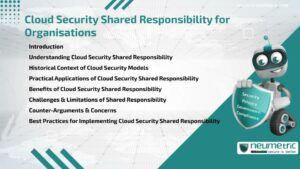Table of Contents
ToggleIntroduction
As more organisations migrate operations to the cloud, understanding responsibilities in securing data & infrastructure becomes critical. Cloud Security shared responsibility is a model that defines the division of security tasks between Cloud Service Providers & their Customers. This approach ensures clarity, reduces Security Gaps & strengthens Compliance. By applying Cloud Security shared responsibility, organisations can mitigate Risks, improve Governance & protect Sensitive Information. This article examines the history, benefits, challenges & Best Practices for Cloud Security shared responsibility.
Understanding Cloud Security Shared Responsibility
Cloud Security shared responsibility is a Framework where Cloud Service Providers manage the security of the cloud infrastructure while organisations remain responsible for securing their Data, Applications & User Access. For example, a provider may ensure the physical security of data centers, while the organisation configures encryption & Access Controls. This model avoids misunderstandings & ensures accountability for both parties.
Historical Context of Cloud Security Models
Traditional IT environments placed full responsibility on the organisation’s internal teams. With the rise of cloud services, providers took on part of the security burden. To clarify these roles, providers such as Amazon Web Services [AWS], Microsoft Azure & Google Cloud introduced the shared responsibility model.
Practical Applications of Cloud Security Shared Responsibility
Organisations apply Cloud Security shared responsibility through:
- Configuring Identity & Access management Policies.
- Implementing Encryption for Sensitive Data.
- Monitoring & Logging User activities.
- Applying Security Patches for applications hosted in the cloud.
- Validating Compliance with standards such as ISO 27001 & SOC 2.
For example, while a cloud provider ensures infrastructure resilience, the organisation must prevent misconfigured storage that could expose Sensitive Data.
Benefits of Cloud Security Shared Responsibility
The main benefits include:
- Clear division of responsibilities between Providers & Organisations.
- Enhanced protection against Cyber Threats.
- Reduced Risk of misconfigurations.
- Stronger Compliance with regulations such as GDPR & HIPAA.
- Increased trust between Providers & Customers.
Cloud Security shared responsibility works like a partnership agreement, where both parties commit to safeguarding different parts of the environment.
Challenges & Limitations of Shared Responsibility
Challenges arise when organisations misunderstand their roles. Misconfigurations remain one of the biggest Risks in cloud environments. Smaller enterprises may also lack resources to manage their part of the responsibilities effectively. Additionally, integrating shared responsibility practices across multi-cloud environments can be complex.
Counter-Arguments & Concerns
Some critics argue that Cloud Security shared responsibility may place an unfair burden on Customers who lack technical expertise. Others highlight that Compliance regulations can be confusing when applied to shared environments. There is also concern that overreliance on providers may lead to Gaps in Accountability.
Best Practices for Implementing Cloud Security Shared Responsibility
To implement effectively, organisations should:
- Understand the provider’s shared responsibility model documentation.
- Train staff on cloud-specific security practices.
- Use automated tools for monitoring & alerting.
- Regularly Audit configurations & Access Controls.
- Align internal Policies with Regulatory requirements.
Conclusion
Cloud Security shared responsibility is essential for ensuring clarity, accountability & strong protection in cloud environments. By dividing roles between Providers & Organisations, Risks are minimised, Compliance is improved & digital resilience is strengthened.
Takeaways
- Cloud Security shared responsibility defines roles between Providers & Organisations.
- Historical shifts from traditional IT to cloud required shared responsibility models.
- Benefits include Compliance, Accountability & reduced Misconfiguration Risks.
- Challenges involve role confusion, resource limitations & multi-cloud complexity.
- Best Practices emphasise training, Monitoring & regular Audits.
FAQ
What is Cloud Security shared responsibility?
It is a model where cloud providers secure infrastructure & organisations secure their data, applications & access.
Why is Cloud Security shared responsibility important?
It is important because it clarifies roles, reduces Security Gaps & ensures stronger Compliance in Cloud Environments.
What challenges do organisations face with shared responsibility?
Challenges include misconfigurations, resource limitations & confusion over regulatory requirements.
How does Cloud Security shared responsibility benefit organisations?
It benefits organisations by improving Governance, reducing Risks & fostering Trust with Providers.
Can small organisations manage Cloud Security shared responsibility?
Yes, but they may need additional training, automated tools or support from managed service providers.
What Best Practices support effective Cloud Security shared responsibility?
Best Practices include reviewing provider documentation, monitoring systems, training teams & conducting regular Audits.
Need help for Security, Privacy, Governance & VAPT?
Neumetric provides organisations the necessary help to achieve their Cybersecurity, Compliance, Governance, Privacy, Certifications & Pentesting needs.
Organisations & Businesses, specifically those which provide SaaS & AI Solutions in the Fintech, BFSI & other regulated sectors, usually need a Cybersecurity Partner for meeting & maintaining the ongoing Security & Privacy needs & requirements of their Enterprise Clients & Privacy conscious Customers.
SOC 2, ISO 27001, ISO 42001, NIST, HIPAA, HECVAT, EU GDPR are some of the Frameworks that are served by Fusion – a SaaS, multimodular, multitenant, centralised, automated, Cybersecurity & Compliance Management system.
Neumetric also provides Expert Services for technical security which covers VAPT for Web Applications, APIs, iOS & Android Mobile Apps, Security Testing for AWS & other Cloud Environments & Cloud Infrastructure & other similar scopes.
Reach out to us by Email or filling out the Contact Form…





